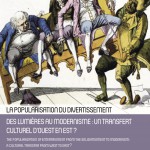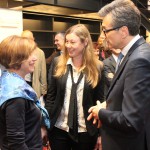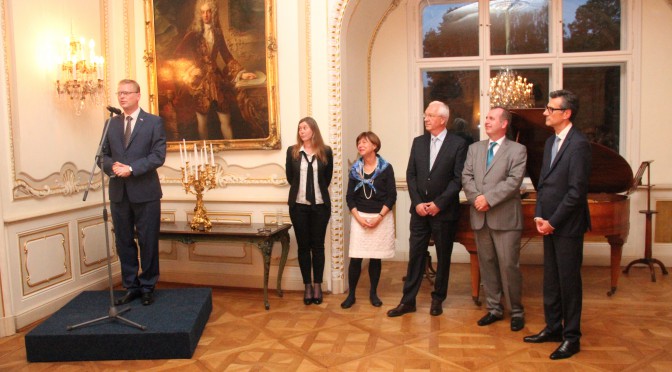 An International Conference organized by EUR’ORBEM and CEFRES.
An International Conference organized by EUR’ORBEM and CEFRES.
Date and Place: 13-14 November 2015, Maison de la Recherche – 28 rue Serpente, 75006 Paris.
Program
Friday 13 November 2015
9:00 – Welcome and opening speeches
9:30 – Introduction to the conference by Xavier Galmiche (Paris-Sorbonne University/ EUR’ORBEM): From Diversion to Entertainment – a Trivial Apophasis?
Panel 1—The Aesthetics of Entertainment
Moderator: Guillaume Métayer (Centre d’étude de la langue et de la littérature françaises des XVII-XVIIIe siècles, CNRS)
10:00-10:25: Julien Labia (Sorbonne Nouvelle University) – The Predilection of Aesthetic Formalism for Light Music: a Philosophical Paradox.
10:25-10:50: Sylvain Briens (Paris-Sorbonne University/ REIGENN) – Lightness as an Exception. Culture of Entertainment and Swedish Literature at the End of 19th Century.
10:50-11:10 : Discussion.
– Coffee Break –
11:30-11:55: Clara Royer (CEFRES / EUR’ORBEM) – Of ”French Lightness” in Hungarian Satirical and Erotic Magazines (1883-1914).
11:55-12:20: Holt Meyer (Erfurt University)—Is Sklovskii’s Formalist-Comic Reading of Tristram Shandy a New Discovery? Russian Romantic, Realist and Symbolist Backgrounds for the Sternian Ostrannie-Syuzhet Link.
12:20-12:40: Discussion.
– Lunch Break –
Panel 2 – The Genres of Entertainment from the Enlightenment to Modernism
Moderator: Jean-François Laplénie (Université Paris-Sorbonne / REIGENN)
14:00-14:25: Ferenc Tóth (Hungarian Academy of sciences) – The Paths of French Literary Entertainment to Hungary at the Age of Enlightenment.
14:25-14:50: Jean Boutan (Paris-Sorbonne University/ EUR’ORBEM) – Sterne and Wieland: Western Patterns of Šebestián Hněvkovský’s Mock Epic Děvín.
14:50-15:10 : Discussion.
– Coffee Break –
15:30-15:55: Gyöngyi Heltai (Université Loránd Eötvös, Budapest) – The “drame militaire à grand spectacle” and the “féerie” – Cultural Transfers between Paris and Budapest (1860-1875).
15:55-16:20: Markéta Holanová (Academy of sciences in the Czech Republic) – The Onset of Detective Novels and Their Reception in the Czech Environment.
16:20-16:40: Discussion.
Saturday 14 November 2015
Panel 3 – From Genres to Practices of Entertainment
Moderator: Stanislaw Fiszer (Lorraine University/ CERCLE)
9:30-9:55: Olga Granasztói (Debrecen University) – Languages and Genres of Entertainment According to the Hungarian Library’s Sources.
11:25-11:50: Diana Grgurić & Svjetlana Janković-Paus (Rijeka University) – Mediterranean Culture in Processes of Cultural Mobility – Rijeka’s Canzonette fiuman.
10:20-10:40: Discussion.
– Coffee Break –
9:55-10:20: Myriam Truel (Lille 3 University/ CECILLE) – Le Sonneur de la cathédrale and Les Marins, or How Russian Lubok Seizes Victor Hugo.
11:00-11:25 : Blanka Hemeliková (Academy of sciences in the Czech Republic) – On Cultural Transfer and Circulation in the Field of Popular Humour and their Limits: on the Material of Czech Satirical Magazines of the 19th century.
11:50-12:10: Discussion.
– Lunch Break –
Panel 4 – Popularizing Entertainment in Practice
Moderator: Markéta Theinhardt (University Paris-Sorbonne / EUR’ORBEM)
14:00-14:25 : Claire Madl (CEFRES) : Reading rooms and Lending Libraries: How They Fostered Reading As an Entertainment Practice.
14:25-14:50: Veronika Čapská (Charles University, Prague) – Whose Laughter? What Subjects? Diversion and Entertainment in the Circles of Silesian Nobility Between Enlightenment and Romanticism.
14h50-15h10: Discussion.
– Coffee Break –
15:30-15:55: Dalia Pauliukevičiūtė (Vilnius University) – Melodramatic Reading and Promises of Serial Fiction at the End of 19th Century Lithuania.
15:55-16:20: Jakub Machek (Charles University, Prague) – Adapting Global Patterns of Sensational Press to Local Audiences: The Examples of Illustrirtes Prager Extrablatt (1879-1882) and Pražský Illustrovaný Kurýr (1893-1918).
16:20-16:40: Discussion.
– Coffee Break –
17:00-17:30: Xavier Galmiche et Clara Royer – A Few Conclusions and a Discussion around Joining in an International Research Project.
 The new library was inaugurated during a ceremony on 7 October at 5PM, in the presence of French Ambassador Jean-Pierre Asvazadourian, president of AV ČR, Prof. Jiří Drahoš, and rector of Charles University, Prof. Tomáš Zima. Representatives from CNRS, Pascal Marty and Diane Brami, as well as Philippe Devaud from the French MFO, had also made the trip to Prague. Colleagues from the three partners of CEFRES Platform were many to attend, including Pro-rector in charge of European Affairs Prof. Lenka Rovná, and Vice-President of the Czech Academy’s section III in Social Sciences and Humanities, Prof. Pavel Baran.
The new library was inaugurated during a ceremony on 7 October at 5PM, in the presence of French Ambassador Jean-Pierre Asvazadourian, president of AV ČR, Prof. Jiří Drahoš, and rector of Charles University, Prof. Tomáš Zima. Representatives from CNRS, Pascal Marty and Diane Brami, as well as Philippe Devaud from the French MFO, had also made the trip to Prague. Colleagues from the three partners of CEFRES Platform were many to attend, including Pro-rector in charge of European Affairs Prof. Lenka Rovná, and Vice-President of the Czech Academy’s section III in Social Sciences and Humanities, Prof. Pavel Baran.


